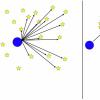I don't know what you are talking about, pamojja, your post comes across as gobbledygook. I suspect you don't understand what excess mortality is, or how it is calculated. There are probably others here who also do not understand what is meant by excess mortality.
Excess mortality is usually calculated by comparing the number of deaths that occur in one week to the same week in the previous year, and maybe to the year before that too, averaging the figures for the previous two years. The excess mortality is any percentage increase or decrease in deaths in one weeked compared to the same week in the previous year.
If you look at ALL countries in the excess death diagram I posted, from Jan 2020 to the end of March 2020, which was just before COVID hit, there were no excess deaths.
In ALL countries, death levels were normal just before the pandemic, and very similar to the previous year. In this period of a few months just before COVID hit, the diagram shows excess deaths for each week to be normal, just a few percent increased or decreased from the previous year.
Then as COVID arrived in multiple countries from about April 2020 onwards, excess deaths shot up in nearly all countries, to values like 50% to 100% or more excess deaths. So as COVID hit, the impact on excess deaths was huge, and a major difference to the time just before the pandemic hit. The diagram shows this very clearly: no major excess deaths before March 2020, then after that time, all hell broke loose.
But New Zealand had almost zero COVID, thanks to the excellent way it handled the pandemic, and the great cooperation between public and government. So New Zealand is about the only country where we can study effect of the COVID vaccines without the complexity of having COVID present at the same time as the vaccines.
And the data clearly show that there is no uptick in deaths during for the entire year after vaccines were rolled out in New Zealand.
You cannot get any better data than that: it's very clear the vaccines are not causing an increase in mortality.
Of course if one is mathematically challenged, or if one has psychiatric issues like schizotypy (a common mild mental illness which makes people paranoid and distrusting of the authorities, which makes people anti-establishment, as well as susceptible to being taken in by conspiracy theories), then no logic or data will sink in.
For anyone who struggles with understanding mathematical data, I can recommend taking the intelligence-enhancing nootropic piracetam. This can improve the ability to understand maths and logic. For those who find themselves unduly paranoid of their government and anti-establishment, consider getting pharmacological treatment for this condition. Don't accept a reduced quality of life by living with low-grade psychosis-spectrum symptoms such as paranoia and undue suspicion. You can even try some of the supplements that can help psychosis, like sarcosine, high dose zinc, niacinamide, or electrical microcurrent treatments like tDCS.
Edited by Hip, 27 November 2022 - 07:05 PM.































































